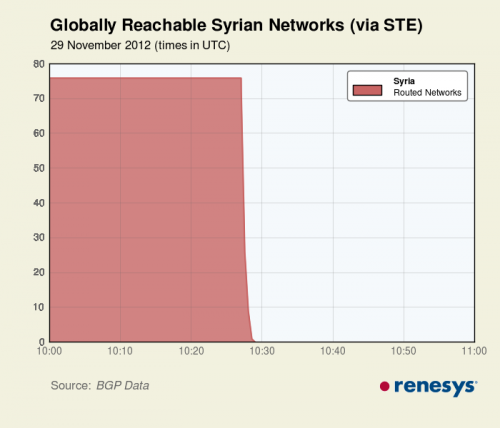Cross-posted at Cyborgology.
On Thursday Syria’s internet was shut down.
This is a serious situation with literal life and death implications. Much of this story has yet to play out. Right now, I want to take a moment to explore one aspect of what this all means. Namely, I want to explore the question: why did the internet shut off now? To do so, I turn to Derrick Bell’s interest convergence theory.
Derrick Bell’s theory of interest convergence is a canonical statement on race relations. Bell famously argues that whites promote racial justice only when doing so converges with their own interests. The key example is the 1954 Brown V. Board of Education case, in which racial integration in schools served the larger U.S. message within the Cold War of human rights, freedom, and equality.
Although many scholars critique the strong version of Bell’s argument for its failure to incorporate agency among blacks, the root of the argument is quite useful in explaining power relations. In short, interest convergence theory tells us that the will of the powerful wades towards the direction of self-interest. When these interests converge with those of the less powerful, the less powerful are better able to achieve their will.
To a degree, I think this framework helps us understand the decision of the Syrian government to shut down communication channels. Syrian rebels utilized digital communication channels to both organize among themselves, and share their experiences — often in real time — with the outside world. This was instrumental in their cause both on the ground and internationally. The real question then, is why did the government maintain these channels for so long? This question is particularly blaring in light of extreme government atrocities, including mass killings of innocent citizens — including children. Moreover, why did the government decide to cut off these channels now?
Internet and communication blackouts are not unique among the Arab uprisings. Egypt and Libyan governments both shut down communication during their respective battles. The Syrian government, however, is unique in its deft use of digital technologies to quash protests, locate dissidents, and suppress the movement. In short, the interests of the powerful (i.e. the government) converged with the less powerful (i.e. the rebels). In addition to appearing somehow less oppressive to the international community, we see here a possible reason for maintaining Internet capabilities despite their strategic importance in the rebel movement.
However, we may speculate that the costs got too high for the government. We may speculate that in light a persistent rebel force, culminating in massive protests in Damascus — so large that the major airport had to be shut down — it no longer served governmental interests to maintain digital connectivity. The interests of the powerful and the less powerful no longer converged.
Certainly, there are other factors in play. This is a minuscule fraction of the story. With that said, this framework suggests that perhaps today’s act by the Syrian government was one of desperation. They were forced to give up a key oppressive resource (digital communication capabilities). This resource was no longer adequately effective for keep the uprising at bay. Now, they must all battle in the dark.
—————————
Jenny Davis is a PhD candidate in the Department of Sociology at Texas A&M University, where she studies the intersection of culture and identity. You can follow her twitter feed at @Jup83.

Comments 12
htownrep24 — December 1, 2012
Great use of Bell's interest convergence to make your argument! Great work! There is also the concept of interest divergence (where the powerful end the action which the less powerful benefited from), so my question is, when do you see this happening with Syria?
Elena — December 1, 2012
It's not the first time the government has ordered an online blackout in Syria. It wasn't particularly useful last time in suppressing communications with the outside either, because you should never underestimate the bandwidth of a donkey laden with CDs (or memory cards).
Ted_Howard — December 1, 2012
This has nothing to do with Bell's theory in the slightest. All you stated was that expected future costs to the Syrian regime of allowing the internet to operate further have come to exceed the expected future benefits to the Syrian regime. This is a trivial argument that doesn't require gussying up with some irrelevant race relations theory.
WG — December 2, 2012
Why is this in Soc Images? It's just a graph, and one that is really not necessary. Just as informative would be text saying, "Syria had access to 78 routed networks, but at about 10:23, they lost all of them." Taa Daa!
russ — December 2, 2012
> The real question then, is why did the government maintain these channels for so long?
That's simple: it was because the Syrian government used trickery to surreptitiously capture activists' passwords and thus access their email, contact lists, etc, making it easier to identify and arrest them.
E.g. see http://www.businessweek.com/articles/2012-11-15/the-hackers-of-damascus
"Users who tried to access Facebook in Syria were presented with a fake
security certificate that triggered a warning on most browsers. People
who ignored it and logged in would be giving up their user name and
password, and with them, their private messages and contacts."